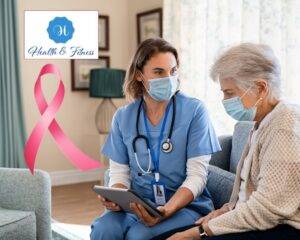Breast Cancer Symptoms and Treatment Tips
Learn to recognize breast cancer symptoms and explore treatment tips to manage the disease. Empower yourself with knowledge for a healthier life.
Breast cancer is a formidable adversary that affects millions of women worldwide. As the second most common cancer among women, it is a topic that deserves our attention and understanding. Breast Cancer Symptoms. In this comprehensive blog post, we will delve into the symptoms of breast cancer, explore the various treatment options available, and provide valuable tips for coping with this life-altering disease. By increasing awareness and knowledge, we can empower ourselves and others to take control of our health and make informed decisions.
Breast Cancer Symptoms: Recognizing the Warning Signs

It can manifest in various ways, and awareness of the potential symptoms is crucial for early detection and successful treatment. Some common symptoms include:
- A lump or thickening in the breast or underarm area
- Changes in the size or shape of the breast
- Nipple discharge or tenderness
- Changes in the skin texture or colour of the breast, such as dimpling or puckering
- Swelling or redness in the breast or underarm area
- Pain in the breast or nipple area
- Inverted nipple or changes in the nipple’s position
- Scaly, flaky, or itchy skin on the nipple or areola
It is essential to remember that not all breast lumps are cancerous. Most breast lumps are benign (non-cancerous). However, if you notice any of these symptoms, it is crucial to consult your doctor promptly. Early detection is the key to successful treatment.
Breast Cancer Risk Factors: Understanding the Contributors
Although the exact cause of breast cancer remains unknown, researchers have identified several risk factors associated with the disease. Some of these risk factors include:
- Age: The risk of developing breast cancer increases with age.
- Gender: Breast cancer is more prevalent in women, although this disease can also affect men.
- Family history: Having a close relative, such as a mother, sister, or daughter, with breast neoplasm increases your risk.
- Genetics: Certain gene mutations, such as BRCA1 and BRCA2, can increase the risk of breast tumours.
- Personal history: Women with breast neoplasm in one breast are at an increased risk of developing cancer in the other breast.
- Hormone exposure: Exposure to estrogen over a long period can increase the risk of breast cancer. This includes early menstruation, late menopause, and hormone replacement therapy.
- Obesity: Being overweight can increase the risk of breast tumours, particularly after menopause.
- Alcohol consumption: Drinking alcohol has been linked to an increased risk of it
Importantly, it is crucial to note that having one or more risk factors does not guarantee that you will develop breast neoplasm. However, by understanding your risk factors, you can make informed decisions about your health and lifestyle.
Breast Cancer Treatment Options: A Multifaceted Approach

Several treatment options for breast cancer are tailored to the individual’s specific needs and circumstances. Some of the most common treatments include:
1- Surgery
Surgery is often the first line of treatment for breast cancer. The type of surgery will depend on the size and location of the tumour. Standard surgical procedures include lumpectomy (removal of the tumour and a handful of surrounding tissue) and mastectomy (removal of the entire breast). In some cases, breast reconstruction surgery may be performed after a mastectomy. Sentinel lymph node biopsy or axillary lymph node dissection may also be performed to determine if cancer has spread to the lymph nodes.
2- Radiation therapy uses high-energy radiation to kill cancer cells.
It is often used after surgery to eliminate any remaining cancer cells and reduce the risk of recurrence. There are two main types of radiation therapy: external beam radiation therapy, which delivers radiation from a machine outside the body, and internal radiation therapy (brachytherapy), which involves placing radioactive material inside the body near the cancer cells.
3- Chemotherapy
Chemotherapy employs powerful drugs to kill cancer cells. Doctors frequently use chemotherapy before or after surgery to shrink the tumour or eliminate any remaining cancer cells. They can administer chemotherapy intravenously, orally, or through both methods. Typically, doctors administer chemotherapy in cycles, allowing for periods of treatment followed by rest to facilitate the body’s recovery.
4-Hormone therapy
Hormone therapy blocks the effects of hormones that can promote the growth of breast cancer cells. It is commonly used in women with hormone receptor-positive breast cancer and can be administered through pills, injections, or surgically induced menopause. Common hormone therapy medications include tamoxifen, aromatase inhibitors, and ovarian suppression. Suppression drugs.
5- Targeted therapy uses drugs to target specific proteins or genes involved in cancer cell growth and spread.
It is often used in women with HER2-positive breast cancer. Targeted therapy can be administered intravenously or orally. Examples of targeted therapy drugs include trastuzumab, pertuzumab, and ado-trastuzumab emotions.
Besides these conventional treatments, several complementary and alternative therapies may help manage the side effects of breast cancer treatment. These include acupuncture, massage therapy, and meditation. It is essential to discuss any complementary or alternative therapies with your doctor before incorporating them into your treatment plan.
Tips for Coping with Breast Cancer: Navigating the Emotional and Physical Challenges
The diagnosis can be an overwhelming and frightening experience. Here are some tips for coping with breast neoplasm and maintaining a positive outlook:
- Take care of yourself: Prioritize self-care during this challenging time. Eat a nutritious diet, get plenty of rest, and exercise regularly to support your physical and emotional well-being. Consider incorporating stress-reduction techniques, such as yoga, meditation, or deep breathing exercises, into your daily routine.
- Seek support: Reach out to friends and family for emotional support and encouragement. Consider joining a support group for women with breast cancer to connect with others who understand your experience. Professional counselling or therapy can also be beneficial in helping you process your emotions and develop coping strategies.
- Stay positive: Cultivate a positive mindset and surround yourself with uplifting people and activities. Engage in hobbies and pastimes that bring you joy and help you maintain a sense of normalcy. Practice gratitude and focus on the positive aspects of your life.
- Educate yourself: Empower yourself with knowledge about breast cancer and your treatment options. Ask your doctor questions and conduct your research using reputable sources, such as the American Cancer Society and the National Cancer Institute.
- Stay organized: Keep track of your appointments, medications, and test results to stay on top of your treatment and feel more in control. Consider using a planner or digital app to help you stay organized. Creating a designated space for medical documents and supplies in your home can also help you feel more organized and in control.
- Communicate with your healthcare team: Establish open communication with your healthcare team and keep them informed about any side effects or concerns you may have. They can provide guidance and support throughout your treatment journey.
Conclusion: Breast Cancer Symptoms
Overcoming breast cancer requires early detection, appropriate treatment, and a positive mindset. While breast cancer presents a significant challenge, it can be conquered with the right approach.t. If you notice any symptoms of breast cancer, consult your doctor immediately. Numerous treatment options are available, including surgery, radiation therapy, chemotherapy, hormone therapy, and targeted therapy. Besides these treatments, moreover, complementary and alternative therapies may help manage the side effects of breast neoplasm treatment. Remember to prioritize self-care, seek support, maintain a positive outlook, educate yourself, and stay organized. You can overcome breast neoplasm and lead a healthy, fulfilling life with the proper treatment and support.
Also read about
How I Knew I Had Colon Cancer: Listen to Your Body’s Urgent Message



